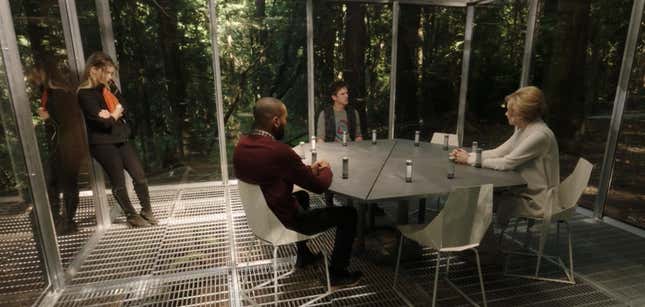
Recently I’ve been binge-watching FX’s Marvel universe show Legion. I don’t really care for superhero stuff, but the show’s portrayal of mental illness has its hooks in me, in particular how everyone says the main character’s name so much.

(Some spoilers for season one and two of Legion follow, as well as discussion of mental illness.)
Legion is in its third and final season on FX (I’m only halfway through season two, though frantically catching up, after being drawn in by ads showing cults). The show focuses on David Haller, a young man who thinks he’s schizophrenic but comes to find out he’s actually a mutant, with the ability to move things with his mind and read people’s thoughts. His mental illness was in fact a manifestation of his mutant powers and of a dark force that took residence in his brain, which he and his mutant friends have to fight. The show’s bizarre aesthetic, with dance sequences and trippy sets, has drawn me in far more than all the X-Men stuff, and I’m both excited to catch up to the episodes currently airing and sad that it will mean I’ll have to wait for new episodes along with everyone else.
Our sister site io9 has written about Legion’s examination of mental illness, in particular how the process David’s mutant compatriots use to help him harness his powers represents the actual slow work of coming to grips with your own brain. The idea that you’re not mentally ill, you’re special, is a compelling one—when Syd, who will eventually become David’s girlfriend, comes to a season one group therapy session, she brings up Picasso and Einstein as examples of people who “weren’t normal,” the way she sees herself. The idea that mental illness can be a gift rather than a deficit is something radical mental health movements like The Icarus Project explore. It’s an idea that can do a lot of good for people who are told the way they are is something to be fixed.
In 2006 I was diagnosed with bipolar II NOS, or “not otherwise specified.” It’s basically the least severe version of bipolar disorder you can have, but that didn’t keep me from being a mess for a while. The crass version of the story, the one I tell to make it sound like it’s all no big deal, is that I woke up one summer morning to find that I had suddenly become a terrible person, and then I spent about a year ruining my life. Like Legion’s mutants, I didn’t know what was happening to me at first. That summer is a blur of careening around on my bike, drinking a ton and slamming around at punk shows like I could parcel the uncontainable energy I had to others if I moshed against them hard enough. (I was moved by a past version of Legion’s Syd employing a similar tactic in season two.) I spent an equal amount of time lying in bed destroyed by a despair that’s defining feature was that one day I could feel sadder than I’d ever felt in my life, only to be impossibly more sad the next day. At my lowest, finding out I could always feel worse became a kind of game. I moved and got a new job, and also doctors, and then I messed all that up too: skipping appointments, running away from work, stopping meds or taking the wrong doses when I didn’t like how I was feeling on them. The down times started numbering far more than the up times, and the up times were like being pumped with a dangerously energetic anguish.
There’s a beauty in Legion’s core idea of you aren’t crazy, you’re magic, as well as David’s awareness of the dangerous places that thinking can take you. David’s demon, the powerful Shadow King, tempts him to use his powers for evil, and his temptation reminds me of all those times I purposefully chased after mania when the depression got to be too much. There’s a season one episode where Legion’s cast goes to a fantasy version of the Clockworks Psychiatric Hospital, where David is bipolar instead of ostensibly schizophrenic, and he worries about how “this mirage, this feeling of clarity, how maybe that’s just a symptom of the other side of the disease kicking in… that invulnerable feeling, it’s dangerous.”
In the world of the show, this is a question of David embracing the dark side of his mutant powers or not. My own memories of mania, besides Legion’s spot-on use of the word “invulnerable,” are people saying my name a lot. Depression usually made me isolate myself, but mania sent me hurtling at the people around me. Legion, perhaps unintentionally, captures how a person’s mental illness can affect others through how often character say “David” in different ways.

Characters say David’s name on Legion a lot. (If you hadn’t noticed this yet, you’re stuck with an awareness of it now, sorry.) The first lines of proper character dialogue are David’s sister Amy singing “Happy Birthday” to him, saying his name in a kind of anxious, faltering way. The voices hiss it. Syd says it lovingly. Characters say his name in alarm. They scream for him when he’s missing, which is fairly often. They say his name fondly in childhood flashbacks. Doctors say it with clinical detachment or forced compassion. In a season two episode about alternate timelines, Amy says his name with different inflections for all the different people he is: rich and dangerous, tweaked out on illegal drugs, pathetically ill. Characters say “David” almost reverently when they need him, which is also fairly often. People ask for or talk about David all the time.
It can be a little grating, even though he’s the show’s protagonist, but it also resonated with me. In season two, the Shadow King says to David, “All the world’s a stage, and you’re the star.” When I was in the thick of handling things badly, I felt like the center of the world—not in a megalomaniacal way, but because I was feeling so many things so intensely that everyone else’s feelings paled in comparison. I felt like I couldn’t help shoving everything that was happening to me at others, even when I didn’t think they’d understand.
My then-boyfriend said my name cautiously when I surprised him at his door on a Wednesday evening even though I lived three states away. My friends said it in annoyance when I’d call them in the middle of the night begging them to do something about how terrible I felt and then refusing to take any of their advice. A doctor said it coolly after I ranted about how psych meds were “a tool of the man,” before he leaned forward and asked very earnestly, “Do you see a man here now?” (This was hilarious to me at the time, and still is.) My coworkers said it totally normally in those flashes when I was OK, and I wanted to bottle up their tone for later because I heard it so rarely. Doctors read it dispassionately off of charts and hospital bracelets. My dad said it breaking with compassion as I explained how depressed I was. My roommate said it wearily when I woke him up at midnight to explain how the ads for this gay dating site were out to get us and I know it sounds nuts but c’mere, look… I said my own name in annoyance, over and over, to insurance companies and appointment lines.
Unlike David’s voices talking to him, I rarely heard my own name in my head. I was buddy or pal when I was exasperated with myself, man when I knew I was fucking up, kid when I’d try to be self-compassionate. I didn’t want to let all those different versions of myself inside of me, because it would mean they were all just me.

In season two, the Shadow King exhorts David to “get up from the kiddie table and come and sit with the big boys.” It’s meant to be a temptation to let his demons win, but I also read it as a question of what it means to really deal with yourself. In Legion, while David has to do some hard work around his mental health, he also gets to wage reality-spanning sci-fi battles alongside his coterie of superpowered friends. Real people don’t get anything so exciting. Eventually, I realized I was the only one who could help myself, and I stopped listening to the parts of me that seemed hell-bent on havoc. I found better doctors. I found better meds and actually took them the way I was supposed to. I stopped lying to my therapist. I told my friends how I was feeling before the feelings went too far. I learned what symptoms to watch out for and how to head them off. It was a long slog with lots of setbacks, but things got better.
These days, my mental illness barely enters my thoughts besides the dread (a word a season two episode of Legion uses so well) that it’ll come back when I least expect it. Similar to themes of timelines Legion explores in season two, I live with a low-level fear of a future version of myself who’s not doing as well as present me, who’s going to show up one day with a lot of sadness and bad ideas. I try to think of him kindly when he scares me. I remind myself I can help him, and, if that doesn’t work, that I can survive him. At the end of the day, I know his name. He’s just me.